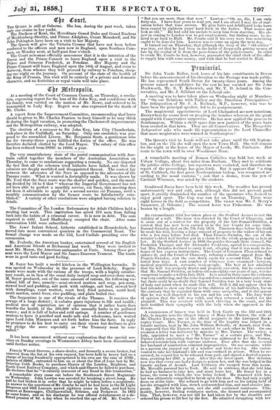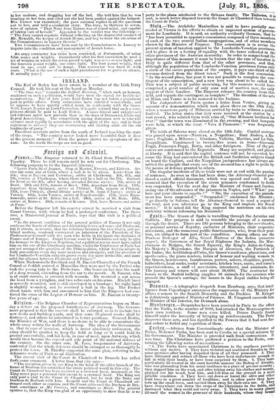routuriat.
Sir John Yarde Buller, took leave of his late constituents in Devon before the announcement of his elevation to the Peerage was made public. He has represented South Devon for twenty-three years. Among the persons named as candidates for the mat he has vacated are Sir John Duckworth, Mr. S. T. Kekewich, and Mr. T. D. Acland in the Con- servative, and Mr. T. Sillifant on the Liberal side.
A meeting was to have taken place on Wednesday night at Manches- ter "On our Relations with Turkey and the Danubian Principalities." The indisposition of Mr. J. A. Roebuck, M.P., however, who was to have been the principal speaker, led to its postponement.
The magisterial appointments of Lord Chelmsford are now notorious. Everywhere he seems bent on peopling the benches whereon sit the great unpaid with Conservative supporters. He has now applied the process to Southampton. Within a short space four new justices of the peace have been created in that town. They are all Conservatives. The Hampshire Independent asks who made the representation to the Lord Chancellor that more magistrates were wanted in Southampton ?
The Queen's visit to Leeds will not take place until the 6th Septem- ber, and on the 7th she will open the new Town Hall. She will remain for the night at the house of the Mayor of Leeds, Mr. Fairbairn. Her route to the town will be over Woodhouse Moor.
A reinarkable meeting of Roman Catholics was held last week at Ushaw College, about five miles from Durham. They met to celebrate the jubilee of the College, but reporters were excluded, and therefore no report of the proceedings has gone forth. But it appears that "a ring of St. Cuthbert, the first great Northumbrian bishop, was recognized ac- cording to the usual customs " ; and that a drama, from the pen of Cardinal Wiseman, was acted by the students.
Goodwood Races have been held this week. The weather has proved unfortunately wet and cold, and, although this did not prevent good sport, it greatly diminished the number of the spectators who desired to enjoy good sport. The Cup was run for on Thursday. There were eight horses in the field as competitors. The victor was Mr. J. Merry's Saunterer, (j. Osborne.) The second horse was Fisherman. He was beaten by a length.
An extraordinary trial has taken place at the Stafford Assizes to test the validity of a will. The issue was directed by the Court of Chancery, and it arose out of a contest for the property of the late Samuel Swinfen, a contest that has new been carried on in the law Courts for some time. Samuel Swinfen died on the 7th July 1854. Nineteen days before his death he made his will, leaving a large amount of property to the widow of his son who a few days before had died. Than Francis Swinfen, the son of the testator's eldest half brother put in a claim for the whole property as heir at law. At the Stafford Assizes in 1856 the parties through their counsel, Sir Frederick Thesiger and Sir Alexander Cockburn, agreed to a compromise, but Mrs. Swinfen declined to carry it out, alleging that it was made in de- fiance of her express instructions. The Court uf Common Pleas refused to enforce it, and the Court of Chancery, refusing a similar appeal from Mr. Francis Swinfen, sent the case down egain for a second trial. This trial lasted four days. A vast number of witnesses were examined—lawyers, medical practitioners, servants, tradespeople. The heir at law admitted that the will was properly drawn and properly executed, but he contended that Mr. Samuel Swinfen, an infirm old man eighty-one years of age, was in- competent to make a will in July 1854. As is usual in these cases the evidence was very conflicting, and the issue depended on a number of minute paticulars ; but there could be no doubt that Samuel Swinfen was in a very weak state of body and mind when he made this will. Still it did not appear that he had intended to show any favour to the children of his half-brother, but on the contrary that he regarded them with some antipathy, and it did appear that he was well disposed to his son and his son's wife. The Jury were of opinion that the will was valid, and they returned a verdict for the plaintiff. This was received with much cheering in the court, and the mob testified their sympathy with the lady when she appeared in the streets.
A commission of lunacy was held in York Castle on the 23d and 24th July, to inquireinto the alleged lunacy of Mary Jane Turner, the wife of Mr. Charles Turner, one of the official assignees in the Liverpool Bank- ruptcy Court. Mrs. Turner, at the time of the inquiry was lodged in a lunatic asylum, kept by Mr. John William Metcalfe, at Acomb, near York. It appeared that the Turners were married to each other in 1845. On one occasion a letter was delivered by mistake to Mrs. Turner. The writer, a lady, appointed to meet a "Mr. Turner" at a certain place, and Mrs. Turner rashly concluding that the letter was addressed to her Mr. Turner, behaved towards him with extreme violence. Ever after that she accused her husband of numberless criminal improprieties. On one occasion, while in a passion she jumped out of a window and broke her leg. She endea- voured to take her husband's life and was confined in prison. When he re- covered, he caused her to be released from gaol, and signed a deed of separa- tion, granting her 2001. a year. After this she lived apart. Her delusion now was that every one had a design to poison her, and she was lodged in the lunatic asylum at Acomb. Last February she escaped from this house. Mr. Metcalfe pursued her to York. He said in evidence, that she told him he had no business to take her, and must leave her. He found her in a house, the room in which she was being locked. Ile reasoned with her, but was ultimately compelled to break open the door. She had only a night dress on at the time. She refused to go with him and on his taking held of her she struggled with him, struck and scratched him, and used abusive lan- guage. He sent for his groom, and she still continued resistance. Ulti- mately, however, finding resistance useless, she dressed and accompanied him. That, however, was not till he had taken her by the shoulder and ordered his groom to lift her by the feet. He admitted struggling with her in her undress, and dragging her off the bed. She told him that he was treading on her toes, and cried out she had been pushed against the bedpost. Mrs. Turner was examined; she gave rational replies to all the questions put to her, and told a consistent story. The Jury, by thirteen to seven, were of opinion "That Mary Jane Turner was of sound mind, and capable of taking care of herself." Appended to the verdict was the following :— "The Jury cannot separate without reflecting on the disgraceful conduct of Mr. Metcalfe, the keeper of Acomb House, and beg to draw the attention of the Commissioners in Lunacy thereto."
Two Commissioners have been sent by the Commissioners in Lunacy to inquire into the condition and management of Acomb house.
An army contractor has twice been convicted, at Portsmouth, of using false scales and weights. Immediately after his first conviction he used a set of weights in which the seven pound weight was seven ounces light, and the fourteen pound weight, one ounce light. The four pound weight, that most in use, could not be found. This contractor was fined 51. with costs. [What is the use of such a light punishment for so grave an offence. it actually pays.]



























 Previous page
Previous page